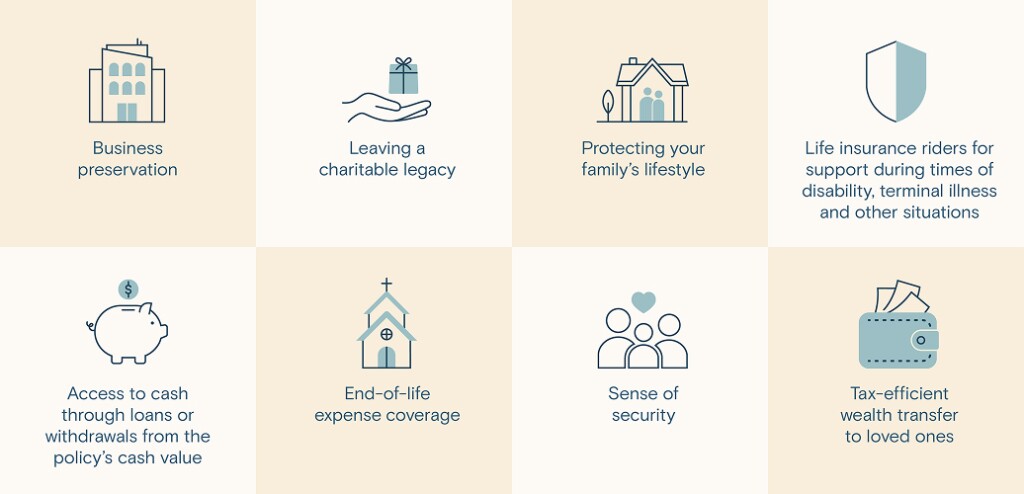Key takeaways
- Single-premium life insurance is paid for with one upfront payment.
- This allows you to secure coverage, simplify your budget and maximize your cash value.
- These life insurance contracts can come with certain tax implications.
When looking for ways to safeguard your family's financial future, you're likely to consider some form of life insurance. You might even come across what's called single-premium life insurance.
This guide can help you understand what single-premium life insurance is and decide whether it's right for you.
What is single-premium life insurance?
Single-premium life insurance is a contract you pay for with one lump-sum payment at the start. You then have coverage for the rest of your life, and your beneficiaries will receive the
As a type of
Whole life. The cash value of whole life insurance generally grows according to a guaranteed rate set when you purchase it.
Universal life. With universal life insurance, the rate your cash value can earn can fluctuate over time. Depending on the insurer or contract you choose, the rate may have a guaranteed minimum.
Variable universal life. With this kind of insurance, your cash value can grow at a variable rate. Rather than earning a contractual interest rate, your balance will fluctuate based on the performance of investments you choose from within the options provided in your contract.
Tax considerations for single-premium life insurance
The cash value of permanent life insurance provides a tax-advantaged source of money you can use however you choose. In a standard contract, the growth is tax-deferred, and you can generally take out tax-free loans as well.1
However, funding your life insurance with a single upfront premium typically classifies the contract as a
What is a modified endowment contract (MEC)?
A MEC is a life insurance contract that receives premium payments in excess of certain Internal Revenue Code (IRC Section 7702A) limits. The "seven-pay test" determines if a contract is a MEC. If you fully fund the contract during the first seven years after acquiring it, then you fail the seven-pay test. "Fully paid" means you don't need to make any more payments to keep your life insurance in force.
By definition, a single-premium life insurance contract is a MEC.
Once your life insurance becomes a MEC, there are different tax implications to consider. Ordinarily, you can borrow from your cash value or take withdrawals from the principal without incurring a tax liability because distributions are assumed to come first from your own contributions. However, distributions from MECs are taxable because the earnings come out first. And if you withdraw money before reaching age 59½, a 10% early withdrawal penalty may apply as well.
Benefits of single premium life insurance
You may want to consider paying for your life insurance with a single upfront payment rather than spreading it out over the life of the contract for several reasons:
- Coverage begins immediately. It starts as soon as you make the payment, providing your beneficiaries with the full death benefit if you die.
- One payment simplifies your budget. There's no need to factor monthly premiums into your budget because you won't have to pay them.
- You get permanent coverage. Your life insurance can't lapse due to missed payments, because there are no future payments to miss.
- Cash value starts building right away. Interest on your lump sum grows immediately, providing you with maximum growth potential.
- You can tap into living benefits. Your contract may have certain options, such as contract loans or drawing from the cash value tax-free.1
Disadvantages of single premium life insurance
Before purchasing your life insurance with a single upfront premium, consider the downsides as well:
- It's a significant lump-sum cost. You're paying for a lifetime contract all at once. This expense can be out of reach for many people.
- There are tax implications. Because it's a MEC, tapping into the cash value of single-premium life insurance can have bigger tax consequences than if your life insurance had been paid for with ongoing premiums.
- You can't make additional contributions. You won't have the option of adding funds to your life insurance contract.
- Better savings alternatives may exist. There may be other ways to strategize for your financial future that earn a better rate of return than the contract's cash value, such as a long-term investment in the market or real estate.
- There are higher fees and penalties. The surrender charges tend to be higher on single-premium life insurance. If you decide to cancel your contract, you may face a steep penalty.
Should you purchase single-premium life insurance?
Paying for your life insurance with one lump sum can simplify your budget, secure coverage and allow you to begin growing cash value immediately. But that doesn't mean it's the best choice. Because of their status as MECs, single-premium policies have certain tax implications to keep in mind.
To better understand how single-premium life insurance might fit into your plans, consider meeting with a







